强读和弱读分析解析
2.强读弱读失去爆破和不完全爆破

I. 语音基础知识:3. 强读和弱读以及失去爆破和不完全爆破3.1 强读和弱读强读和弱读是英语中独特的,具有鲜明色彩的特点之一。
英语中大约有50个最常用的单音节词,如a, of, from, as, and 等,它们每个词都有两种不同形式的读音。
一种形式叫强读,另一种形式叫弱读。
例如,from 的强读形式是/♐❒❍/,弱读形式是/♐❒☜❍/,as 的强读形式/✌/,弱读形式是/☜/。
为什么要注意弱读:1.在连贯语句中弱读音节出现的频率远远大于强读音节。
2.弱读形式是中国人学习英语的难点。
3.弱读形式掌握不好会影响说话的流利程度,应该重读的音节不能突出,因而会造成交际时对方的误解。
有些人常常抱怨外国人说话太快听不懂,实际上并不是听不懂单词,而是不熟悉英语的语流、节奏——在相当程度上是因为不熟悉英语弱读形式而造成的。
学习弱读形式要注意:弱读形式不同于强读形式:1) 弱读形式和强读形式各自的元音不同;2) 弱读音节中常常省略了某一个音。
1.大多数有弱读形式的单词中,元音都变成了/☜/at /☜♦/ as /☜/ had /♒☜♎/ must /❍☜♦♦/2.有少数几个单词的弱读形式变成了/i/。
例如:be /♌♓/ been /♌♓⏹/ me /❍♓/ the /❆♓/ (在元音前,如the other/❆♓✈❆☜/)3.有时,一些常用词的弱读形式中省略了一个元音。
例如:am /❍/ has / / have /❖/ is / /4.有时,一些常用的弱读形式中省略了一个辅音。
例如:and /☜⏹/ have /☜❖/ would /☜♎/ her /☜/跟读练习(有录音)以下是常用单词的弱读形式和例子:除此以外,日常口语中通常用的缩略形式也可以看成是一种弱读形式如:少数情况需要用强读形式(尽管在句中没有重音)。
遇到以下这些情况时,一般不用弱读形式而用强读形式:助动词:(注意:只有在用简略回答的时候,助动词才用强读形式。
英语弱读规律表常见弱读词汇

英语弱读规律表常见弱读词汇Ting Bao was revised on January 6, 20021W e a k F o r m s弱读在英语中,与句重音相对应的出现的是非重读音节,它们一起构成了句子的高低起伏,强弱交替的节奏模式,形成具有表意功能的连贯句子。
这些非重读音节体现在单个单词中就是常说的某些单音节的弱读或非重读(unstressed syllable)。
英语是节奏感很强的语言,要掌握好英语节奏,首先要熟悉强读式(strong forms)和弱读式(weak forms),它对语言连贯、流畅性起着重要的作用。
一、强读和弱读强读和弱读实际就是重读和弱读,一句话中至少有一个重要的音节要重读,其他音节相应弱读。
重读音节从音高和音强上应该big, strong, important loudly,非重读音节(弱读)就应该是weak or small or quiet。
强读和弱读通过一定形式在句子中体现,英语中有接近五十多个单音节词有两种读音形式:弱读形式和强读形式。
在连贯的语言中弱读形式的使用比强读形式更多,更重要。
重读或强读形式其实是单个单词发音的基本形式,即音标中的读音形式,而弱读形式从音质上和强读形式比较起来短而轻;在前面学习中,我们知道短元音//和/i/常出现在非重读音节中,因此多数弱读形式体现也以//或/i/体现。
二、弱读形式从上一单元可以知道,在英语句子中,实词一般要重读虚词弱读,其中有弱读形式的单音节词根据不同类别可以分为以下几种:冠词、人称代词、be动词、助动词、情态动词、单音节介词、单音节、连词以及其他特殊词。
其弱读形式见表从表8-1中,我们对五十多个单音节词的弱读形式进行归纳,得出三个规律:1) 弱读形式以//为主,大部分的弱读形式都和//有关,极少部分与/i/和/u/有关,如 a //, some /sm/; who /hu,u/ my /mi/。
2)如果单词是发长音,其弱读形式一般变成相应短音,如:be /bi/been /bin/her /h/等。
(完整版)英语弱读规律表(54常见弱读词汇)

Weak Forms 弱读在英语中,与句重音相对应的出现的是非重读音节,它们一起构成了句子的高低起伏,强弱交替的节奏模式,形成具有表意功能的连贯句子。
这些非重读音节体现在单个单词中就是常说的某些单音节的弱读或非重读(unstressed syllable)。
英语是节奏感很强的语言,要掌握好英语节奏,首先要熟悉强读式(strong forms)和弱读式(weak forms),它对语言连贯、流畅性起着重要的作用。
一、强读和弱读强读和弱读实际就是重读和弱读,一句话中至少有一个重要的音节要重读,其他音节相应弱读。
重读音节从音高和音强上应该big, strong, important loudly,非重读音节(弱读)就应该是weak or small or quiet。
强读和弱读通过一定形式在句子中体现,英语中有接近五十多个单音节词有两种读音形式:弱读形式和强读形式。
在连贯的语言中弱读形式的使用比强读形式更多,更重要。
重读或强读形式其实是单个单词发音的基本形式,即音标中的读音形式,而弱读形式从音质上和强读形式比较起来短而轻;在前面学习中,我们知道短元音/ə/和/i/常出现在非重读音节中,因此多数弱读形式体现也以/ə/或/i/体现。
二、弱读形式从上一单元可以知道,在英语句子中,实词一般要重读虚词弱读,其中有弱读形式的单音节词根据不同类别可以分为以下几种:冠词、人称代词、be动词、助动词、情态动词、单音节介词、单音节、连词以及其他特殊词。
其弱读形式见表从表8-1中,我们对五十多个单音节词的弱读形式进行归纳,得出三个规律:1) 弱读形式以/ə/为主,大部分的弱读形式都和/ə/有关,极少部分与/i/和/u/有关,如 a /ə/, some /səm/; who /hu,u/ my /mi/。
2)如果单词是发长音,其弱读形式一般变成相应短音,如:be /bi/been /bin/her /hə/等。
3)在语流很快时或者可以缩略的单词中,常常只出现辅音,如 will/l/is /z,s/am /m/等。
英语中读音中强读、弱读、连读、失爆等规则..

英语中读音中强读、弱读、连读、失爆等规则..连读、加音、爆破、同化、省音、弱读、浊化——英语常见语流现象1.连读:两个相邻单词首尾音素自然的拼读在一起,中间不停顿,被称为连读。
连读只发生在同一意群之内,即意思联系紧密的短语或从句之内。
1)词尾辅音+词首元音,如:Standˆup.Notˆatˆall.Putˆitˆon, please.Please pickˆitˆup.I'mˆanˆEnglish boy.Itˆisˆanˆold book.Let me haveˆa lookˆatˆit.Ms Black worked inˆanˆoffice.I called you halfˆanˆhourˆago.2)词尾不发音r或re+词首元音,词尾r发音/r/。
如:farˆawayHereˆis a letter for you.Hereˆare fourˆeggs.Whereˆis my cup?Whereˆare your brotherˆand sister?They're my fatherˆand mother.I looked forˆit hereˆand there.Thereˆis a football underˆit.Thereˆare some books on the desk.注:当有意群进行停顿时不可连读。
如:Isˆit a hat orˆa cat?(hat 与or 之间不可以连读)Thereˆisˆa good book in my desk.(book 与in 之间不可以连读)Can you speakˆEngli sh or French?(English 与or 之间不可以连读)Shall we meet atˆeight or ten tomorrow morning? (meet 与at eight 与or 之间不可以连读)She opened the door and walkedˆin. (door 与and 之间不可以连读)2.加音:在连贯的语流中,人们往往会在两个元音之间加入一个外加音帮助发音,从而更加流畅地表达意思。
英语中读音中强读、弱读、连读、失爆等规则

连读、加音、爆破、同化、省音、弱读、浊化--英语常见语流现象1.连读:两个相邻单词首尾音素自然的拼读在一起,中间不停顿,被称为连读。
连读只发生在同一意群之内,即意思联系紧密的短语或从句之内。
1)词尾辅音+词首元音,如:Standˆup.Notˆatˆall。
Putˆitˆon, please.Please pickˆitˆup。
I'mˆanˆEnglish boy。
Itˆisˆanˆold book.Let me haveˆa lookˆatˆit.Ms Black worked inˆanˆoffice。
I called you halfˆanˆhourˆago。
2)词尾不发音r或re+词首元音,词尾r发音/r/。
如:farˆawayHereˆis a letter for you。
Hereˆare fourˆeggs。
Whereˆis my cup?Whereˆare your brotherˆand sister?They’re my fatherˆand mother.I looked forˆit hereˆand there.Thereˆis a football underˆit。
Thereˆare some books on the desk。
注:当有意群进行停顿时不可连读.如:Isˆit a hat orˆa cat?(hat 与or 之间不可以连读)Thereˆisˆa good book in my desk.(book 与in 之间不可以连读)Can you speakˆEnglish or French?(English 与or 之间不可以连读)Shall we meet atˆeight or ten tomorrow morning? (meet 与at eight 与or 之间不可以连读)She opened the door and walkedˆin。
英语中读音中强读、弱读、连读、失爆等规则
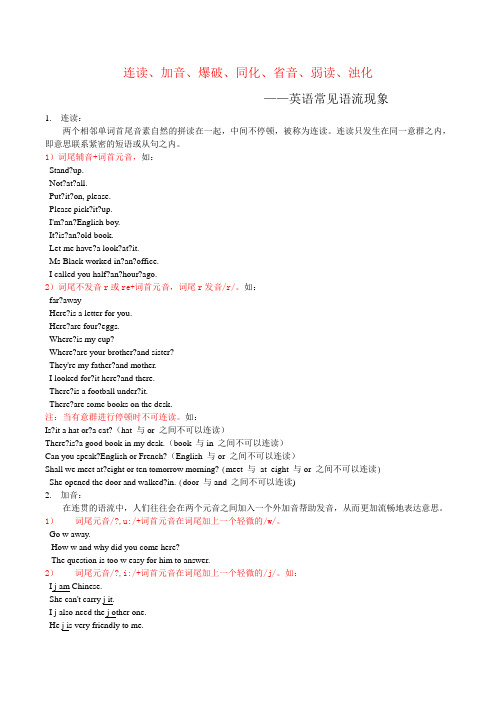
连读、加音、爆破、同化、省音、弱读、浊化——英语常见语流现象1.连读:两个相邻单词首尾音素自然的拼读在一起,中间不停顿,被称为连读。
连读只发生在同一意群之内,即意思联系紧密的短语或从句之内。
1)词尾辅音+词首元音,如:Stand?up.Not?at?all.Put?it?on, please.Please pick?it?up.I'm?an?English boy.It?is?an?old book.Let me have?a look?at?it.Ms Black worked in?an?office.I called you half?an?hour?ago.2)词尾不发音r或re+词首元音,词尾r发音/r/。
如:far?awayHere?is a letter for you.Here?are four?eggs.Where?is my cup?Where?are your brother?and sister?They're my father?and mother.I looked for?it here?and there.There?is a football under?it.There?are some books on the desk.注:当有意群进行停顿时不可连读。
如:Is?it a hat or?a cat?(hat 与or 之间不可以连读)There?is?a good book in my desk.(book 与in 之间不可以连读)Can you speak?English or French?(English 与or 之间不可以连读)Shall we meet at?eight or ten tomorrow morning? (meet 与at eight 与or 之间不可以连读)She opened the door and walked?in. (door 与and 之间不可以连读)2.加音:在连贯的语流中,人们往往会在两个元音之间加入一个外加音帮助发音,从而更加流畅地表达意思。
英语强读和弱读等

英语强读和弱读时间:2011-10-14 08:26来源:未知作者:admin 点击: 27 次强读式和弱读式这二个概念是英语语音学习中不易掌握的一个难点,特别是弱读式就更难一点,而且,人们还经常忽视它。
在英语发音中,英语发音是由各部分组成的,无论缺少那一部,发音都是不完整的,弱读式与强读式相比难掌握,把握不好单词的弱读式,尤其是非重词的弱读式,就会导致说话不流畅,从而失去英语特有的节奏感。
以下介绍强读式和弱读式的概念及其一般规律,细细口味这些规律,多加练习,掌握强读式和弱读式不在话下。
强读式:在英语语流中,实词(包括名词、实义动词、形容词、副词、数词等)一般都接受句子重音,为重读词,采用强读式。
弱读式:虚词(包括介词、代词、连词、冠词等功能词)一般都不接受句子重音,为非重读词,采用弱读式。
强读式和弱读式的一般规律1.弱读式只出现在句子的非重读词中,如:Pass me the book.把书给我。
代词me和定冠词the 弱读,采用弱读式,分别读作/mi/和/ð i/。
You can come later.你可以稍后再来。
情态动词can 弱读,采用弱读式,读作/k n/。
2.单词单独出现时,无论采用实词还是虚词都采用强读式,如:do /du:/做; sun /sʌn/太阳;clean /kli:n/干净的3.出现在句首或句末的单词,无论是实词还是虚词都采用强读式。
That is my sister.那是我的姐姐。
句首的代词that 用强读式,读作/ðæt/。
4.在句中被特别强调的实词或虚词,采用强读式,如:I am Peter.我就是彼得。
句中的be动词am 被强调,采用强读式,读作/æ m/。
虚词的强读式和弱读式一般情况下,虚词在句子中不重读,常以弱读形式出现在语流中。
因而,虚词一般有一个或一个以上的弱读形式。
虚词弱读的读音变化规律1.长音弱读变短。
She are do强读式:/ʃi:/ / a:/ /du:/弱读式:/ʃi/ /☜/ /d☜/2.元音前面的辅音被省略。
强读和弱读

Have you ever tried Diane’s Cakes?
so They are delicious. I have eaten many
different kinds of cakes,
but, I have never tasted anything, quite like cakes
• 29) had /həd/, /d/ • They had better hurry.
• 30) has /əz/ • What has he done? • He has just arrived.
• 31) do /du/, /də/ • Do you think so?
• 32) does /dəz/ • When does he leave?
• 6) some /səm/ • There are some copies here.
• 7) any /əni/ • There aren't any more.
• 8) he /hi/ • Does he want any?
• 9) her /hə/ • I've met her mother.
朗读下列句子,注意弱读
• 1) to /tə/ but /bət/ • I want to come but I can't. • 2) and /ənd/ • He's rich and famous. • 3) than /ðən/ /ðn/ • Better than that. • He's older than she is. • 4) but /bət/ • She wants to sing but she can't. • 5) such /sət∫/ • We have problems, such as pollution.
英语中读音中强读弱读连读失爆等规则
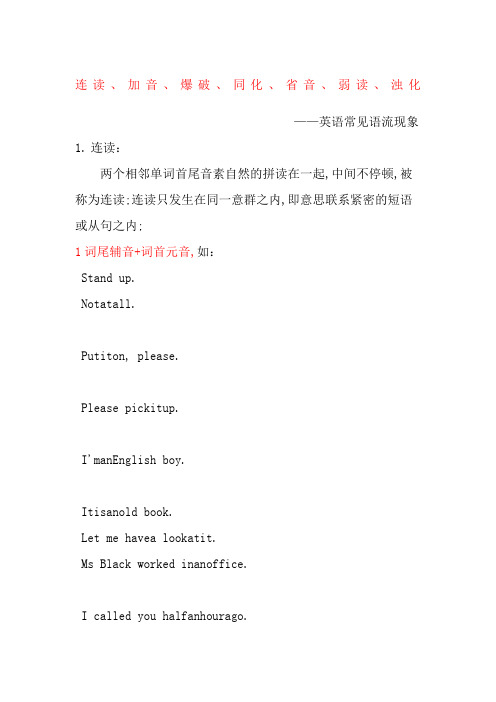
连读、加音、爆破、同化、省音、弱读、浊化——英语常见语流现象1.连读:两个相邻单词首尾音素自然的拼读在一起,中间不停顿,被称为连读;连读只发生在同一意群之内,即意思联系紧密的短语或从句之内;1词尾辅音+词首元音,如:Stand up.Notatall.Putiton, please.Please pickitup.I'manEnglish boy.Itisanold book.Let me havea lookatit.Ms Black worked inanoffice.I called you halfanhourago.2词尾不发音r或re+词首元音,词尾r发音/r/;如:far awayHere is a letter for you.Hereare foureggs.Whereis my cupWhereare your brotherand sisterThey're my father and mother.I looked forit hereand there.Thereis a football underit.There are some books on the desk.注:当有意群进行停顿时不可连读;如:Isit a hat ora cathat 与or 之间不可以连读Thereisa good book in my desk.book 与in 之间不可以连读Can you speakEnglish or FrenchEnglish 与or 之间不可以连读Shall we meet ateight or ten tomorrow morning meet 与 at eight 与or 之间不可以连读She opened the door and walked in. door 与and 之间不可以连读2.加音:在连贯的语流中,人们往往会在两个元音之间加入一个外加音帮助发音,从而更加流畅地表达意思;1)词尾元音/2),u:/+词首元音在词尾加上一个轻微的/w/;Go w away.How w and why did you come hereThe question is too w easy for him to answer.3)词尾元音/4),i:/+词首元音在词尾加上一个轻微的/j/;如:I j am Chinese.She can't carry j it.I j also need the j other one.He j is very friendly to me.She wants to study j English.It'll take you three j hours to walk there.3. 失去爆破与不完全爆破:1失去爆破:爆破音+爆破音当两个爆破音/p,b,t,d,k,g/相邻时,前一个爆破音只按其发音部位做好发音口形、形成阻碍而不爆破出来,稍微停顿后即发出后面的辅音;前一个爆破音被称为失去爆破;失去爆破产生的原因大体上是由于省力原则造成的;如:Kept/Blackboard/Notebook/Goodbye/September/Suitcase/Big boy/Sharp pencilWhat timeYou must pay.Ask Bob to sit behind me.She took good care of the children.2不完全爆破:A爆破音+摩擦音:爆破音/p,b,t,d,k,g/与摩擦音/f,v,s,z,,,θ,e,r,h/相邻时产生不完全爆破;发摩擦音时发音器官并不形成阻碍而只形成一个很狭小的缝隙让气流从缝隙中摩擦而出;如果一个爆破音与摩擦音相接它爆破冲出的气流只能从狭小的缝隙中通过这种爆破是不完全的;失去爆破产生的原因大体上是由于省力原则造成的;如: Advance/SuccessA good viewOld friendsJust thenGet throughMake sureNight showKeep silenceKeep that in mindB爆破音+破擦音:爆破音与破擦音/t,d,tr,dr/相邻时产生不完全爆破;如Picture/ObjectThat childGood jobSweet dreamGreat changesA fast trainC爆破音+鼻辅音:爆破音与鼻辅音/m,n,/相邻时:在词中,不完全爆破;在词尾鼻腔爆破;如:Utmost/Admit/Midnight/Certain/Button/GardenGood morningGood nightStart nowI don’t knowJust momentA good neighborD爆破音+边辅音:爆破音与边辅音/l/相邻时:在词中,不完全爆破;在词尾舌侧爆破;如:Lately/Badly/Mostly/FriendlyA bit louderI’d like toStraight lineGood luckAt lastAt lunch4.同化:人们在说话的时往往会不自觉地让一个音受相邻音的影响,使它们变得与其相同或相似;或者两个音互相影响变为第三个音;这两种现象被称为音的同化;同化可以发生在同一个词、复合词内或者句子相邻词之间;1因声带的影响而发生的同化:A浊辅音可变为清辅音,如:ofv→f course hisz→s pen withe →θ pleasure;B清辅音可变为浊辅音,如:likek→g that;2因发音部位的影响而发生的同化:A/t/+/j/→/t/;如:Don’t hu rt yourselfI’ll le t you go this time.Don’t you do that again.It’s very nice to mee t you.B/d/+/j/→/d/;如:Did your sister comeWould you please come inCould you read this for me please You didn’t like English, did youC/s/+/j/→//;如:I miss you.May God bless you.We will come this year.D/z/+/j/→//;如:Here’s your ticket.I love you because you are you.Don’t expect he tell s you the truth5. 省音:在快速、随便的言语中一些音素被省略掉被称为省音;省音能提高语速,使说话省力;在正式场合和语速慢的情况下,省音不是必须的;1同一单词内元音的省略,主要是非重读音节中的//和//,如:ordinary;2当前一单词以辅音结尾,后一单词以//开头时,//常被省略,如:walk away;3当前一单词以否定形式-n't结尾,后一单词以辅音开头时,/t/常被忽略,如:She isn’t there.I didn’t hear you.He can’t believe that.4)任何一个辅音若后面紧跟着/h/,/h/可以不发音;如:Come hereMust he /ti/ goWhat will he /wili/doHas he done it beforeTell him to ask her…5)将多个单词利用连读爆破等拼和在一起;如:gottagot togonnagoing tokindakind oflotsalots ofgimmegive me6. 强读式和弱读式:在一个句子,有些词说得又轻又快,而且较为含糊,有些词则说得又重又慢,而且较为清晰;那些说得响亮而清晰的词就是句子重音所在;实词包括名词、实义动词、形容词、副词、数词疑问词等一般都接受句子重音,为重读词,采用强读式:虚词包括介词、代词、连词、冠词、助动词、情态动词等功能词一般都不接受句子重音,为非重读词,采用弱读式;6.1 一般规律:1弱读式只出现在句子的非重读词中;如:Pass me/m/ the/e/ book. me、the弱读;2单词单独出现或在句首或句尾时,都采用强读式;如:What are you listening to/tu:/3被特别强调的词无论实词还是虚词都采用强读式;如:I am/ m/ Peter. 我就是皮特;6.2 虚词弱读规律:1长音变短音,如:she/i:/弱读//;2元音前面的辅音被省略,如:him/h m/弱读/m/;3辅音前面的元音被省略,如:am/m/弱读/m/;4元音一般弱读为//,如:can/k n/弱读/k n/;5部分虚词有多种弱读式,如:would/w d/弱读/d,d/;7. 浊化:1/s/ 后面的清辅音要浊化;如:/k/浊化成/g/: scar/school/discussion/t/浊化成/d/: stand/student/mistake/p/浊化成/b/: spring/spirit/expression2美音中,当/t/出现在两个元音之间并且处于非重读位置的时候,/t/需要浊化成一个近似于/d/的音;这样,writer听起来和rider 的发音几乎没有区别;如:Letter/water/better/duty/bitter/cityI got it.Would you please pick it up注:/t/如果处于重读位置的话,即使在两个元音之间也不需要浊化;请比较:清晰的/t/ 浊化的/t/I'talian 'Italya'tomic 'atomLa'tino 'Latinpho'tographer 'photograph3美音中,当/t/前面是一个元音,后面是一个模糊的/l/,且处于非重读位置,/t/也需要浊化成一个近似于/d/的音;如:Battle/bottle/cattle/little/rattle/settle4美音中,当/t/前面是一个清辅音或前鼻音/n/,后面是一个元音,且处于非重读位置,/t/也需要浊化成一个近似于/d/的音;如:Twenty/fifty/center/after/faster/actor/sister/yesterday 朗读练习:1. There are many things to consider when you are looking for a house, whether you intend to buy or only rent. After all, it is going to be your home, perhaps for quite a long time, and you want to be happy with it. You have to decideexactly what kind of house you want, how much you can afford to pay, and the type of neighborhood you wish to live in. However, it’s always easy to forget all above, because it’s most probably that you’ll fall in love with the house for sale at the first sight.2. YouthYouth is not a time of life; it is a state of mind; it is not a matter of rosy cheeks, red lips and supple knees; it is a matter of the will, a quality of the imagination, a vigor of the emotions; it is the freshness of the deep springs of life.Youth means a temperamental predominance of courage over timidity, of the appetite for adventure over the love of ease. This often exists in a man of sixty more than a boy of twenty. Nobody grows old merely by a number of years. We grow old by deserting our ideals.Years may wrinkle the skin, but to give up enthusiasm wrinkles the soul. Worry, fear, self-distrust bows the heart and turns the spirit back to dust.Whether sixty or sixteen, there is in every human being's heart the lure of wonder, the unfailing childlike appetite for what's next, and the joy of the game of living.In the center of your heart and my heart there is a wireless station; so long as it receives messages of beauty, hope, cheer, courage and power from men and from the Infinite, so long are you young.When the aerials are down, and your spirit is covered with snows of cynicism and the ice of pessimism, then you are grown old, even at twenty; but as long as your aerials are up, to catch the waves of optimism, there is hope you may die young at eighty.。
英语弱读

• 34) could /kəd/ • Could you do it now?
• 35) should /∫əd/
• How should I know?
10
• them /ðəm/ /ðm/ • Tell them what to do.
• there /ðə/ There is nothing left. There are not enough.
a
11
a
12
• am /m/ • has/z/ • have /v/ • is /z/
• 5. 有时,一些常用的弱读形式中省略了一个辅音。 例如: and / ən/
have / əv/ would / əd/ her / ə:/
a
2
要在连贯说话中应用弱读形式,不是 懂得了道理就能学会的,也不是一朝 一夕就能掌握的,需要通过大量的模 仿和练习才能学好。 下面所列的是常用单词的弱读形式和 例子:
弱读
英语中大约有50个最常用的单音节词,如a, of, from, as,and等,他们每个词都有两种不同的读音。一种形式叫 强读。另一种形式叫弱读。例如,from的强读形式是 /frɔm/,弱读形式是/frəm/,as的强读形式是/ æ z/ ,弱读形式 是/əz/。
1.弱读形式不同与强读形式,因为 1)弱读形式和强读形 式各自的元音不同。 2)弱读音节中常常省略了某一个音。
2.大多数有弱读形式的单词中,元音都变成了/ ə/,例如:
at / ət/ ; as /əz/; had / həd/ must /m əst/
3.有少数几个单词的弱读形式变成了/i/
be /i/
been /bin/
me /mi/
英语弱读规律表(54常见弱读词汇)之欧阳引擎创编
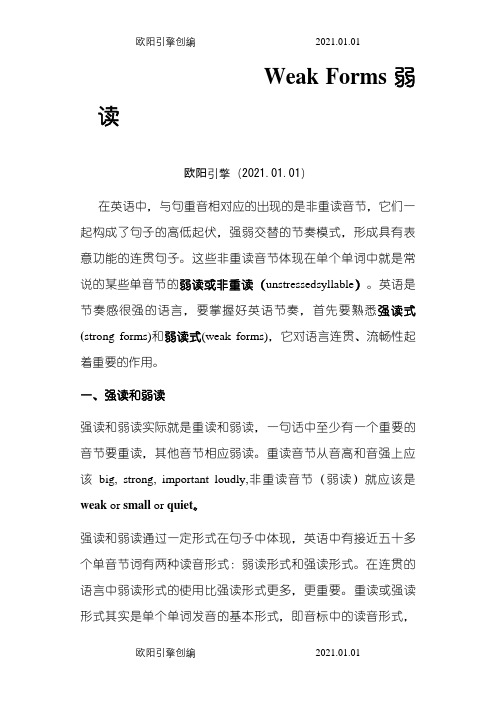
Weak Forms 弱读欧阳引擎(2021.01.01)在英语中,与句重音相对应的出现的是非重读音节,它们一起构成了句子的高低起伏,强弱交替的节奏模式,形成具有表意功能的连贯句子。
这些非重读音节体现在单个单词中就是常说的某些单音节的弱读或非重读(unstressedsyllable)。
英语是节奏感很强的语言,要掌握好英语节奏,首先要熟悉强读式(strong forms)和弱读式(weak forms),它对语言连贯、流畅性起着重要的作用。
一、强读和弱读强读和弱读实际就是重读和弱读,一句话中至少有一个重要的音节要重读,其他音节相应弱读。
重读音节从音高和音强上应该big, strong, important loudly,非重读音节(弱读)就应该是weak or small or quiet。
强读和弱读通过一定形式在句子中体现,英语中有接近五十多个单音节词有两种读音形式:弱读形式和强读形式。
在连贯的语言中弱读形式的使用比强读形式更多,更重要。
重读或强读形式其实是单个单词发音的基本形式,即音标中的读音形式,而弱读形式从音质上和强读形式比较起来短而轻;在前面学习中,我们知道短元音/ə/和/i/常出现在非重读音节中,因此多数弱读形式体现也以/ə/或/i/体现。
二、弱读形式从上一单元可以知道,在英语句子中,实词一般要重读虚词弱读,其中有弱读形式的单音节词根据不同类别可以分为以下几种:冠词、人称代词、be动词、助动词、情态动词、单音节介词、单音节、连词以及其他特殊词。
其弱读形式见表从表8-1中,我们对五十多个单音节词的弱读形式进行归纳,得出三个规律:1) 弱读形式以/ə/为主,大部分的弱读形式都和/ə/有关,极少部分与/i/和/u/有关,如 a /ə/, some /səm/; who /hu,u/ my /mi/。
2)如果单词是发长音,其弱读形式一般变成相应短音,如:be /bi/been /bin/her /hə/等。
强读和弱读

18) frm frm He cmes frm Englan.
1) f v I' lve a cp f ea.
20) gh g.
弱读的规则一般是:元音音节弱化成 [ə] 或[i] 。 如下几个单词:at, of, the, to, as, than, and, or, his, a, an, but, been, for, her, we, be, shall, was, them, 弱读的 频率达到90%,其中a, an, the, than极少用强式。 查字典会发现这些词都至少有两种读音,如for: 重 读时[fכ:] , 弱读时 [fə];as的强读形式是/ æz/ ,弱
12) Wha hink?
13) r Take r ime.
14) s s Le s hink i ver.
15) ha This is he hse ha Jack
读形式是/əz/。
• 大多助动词、系动词、介词、 连词、冠词、代词,都有两 种发音形式:强读式、弱读 式。
• 这些单词往往都是单音节单 词。
弱读的形式
1.大多数有弱读形式的单词中,元音都变成了/ ə /; at / ət/ ; as /əz/; had / həd/;must /məst/ 2.有少数几个单词的弱读形式变成了/i /; be /i/; been /bin/; me /mi/; the /ði/
38) when wn Her parens ha een ea when she was a chil.
3) will l, l He will g ack hme mrrw.
英语中读音中强读、弱读、连读、失爆等规则
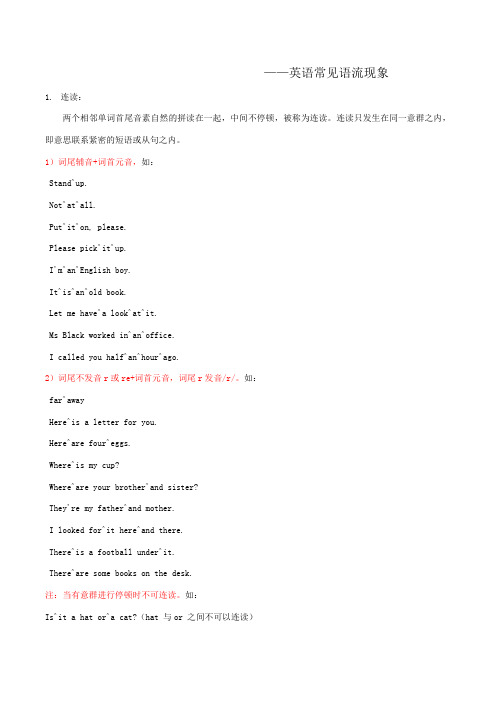
——英语常见语流现象1.连读:两个相邻单词首尾音素自然的拼读在一起,中间不停顿,被称为连读。
连读只发生在同一意群之内,即意思联系紧密的短语或从句之内。
1)词尾辅音+词首元音,如:Standˆup.Notˆatˆall.Putˆitˆon, please.Please pickˆitˆup.I'mˆanˆEnglish boy.Itˆisˆanˆold book.Let me haveˆa lookˆatˆit.Ms Black worked inˆanˆoffice.I called you halfˆanˆhourˆago.2)词尾不发音r或re+词首元音,词尾r发音/r/。
如:farˆawayHereˆis a letter for you.Hereˆare fourˆeggs.Whereˆis my cup?Whereˆare your brotherˆand sister?They're my fatherˆand mother.I looked forˆit hereˆand there.Thereˆis a football underˆit.Thereˆare some books on the desk.注:当有意群进行停顿时不可连读。
如:Isˆit a hat orˆa cat?(hat 与or 之间不可以连读)Thereˆisˆa good book in my desk.(book 与in 之间不可以连读)Can you speakˆEnglish or French?(English 与or 之间不可以连读)Shall we meet atˆeight or ten tomorrow morning? (meet 与 at eight 与or 之间不可以连读)She opened the door and walkedˆin. (door 与and 之间不可以连读)2.加音:在连贯的语流中,人们往往会在两个元音之间加入一个外加音帮助发音,从而更加流畅地表达意思。
强读与弱读
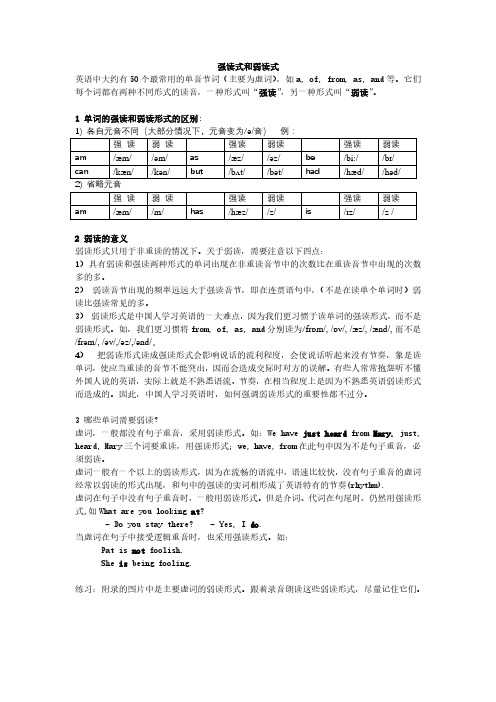
强读式和弱读式英语中大约有50个最常用的单音节词(主要为虚词),如a, of, from, as, and等。
它们每个词都有两种不同形式的读音,一种形式叫“强读”,另一种形式叫“弱读”。
1 单词的强读和弱读形式的区别:强读弱读强读弱读强读弱读am as becan but had强读弱读强读弱读强读弱读am has is2 弱读的意义弱读形式只用于非重读的情况下。
关于弱读,需要注意以下四点:1)具有弱读和强读两种形式的单词出现在非重读音节中的次数比在重读音节中出现的次数多的多。
2)弱读音节出现的频率远远大于强读音节,即在连贯语句中,(不是在读单个单词时)弱读比强读常见的多。
3)弱读形式是中国人学习英语的一大难点,因为我们更习惯于读单词的强读形式,而不是弱读形式。
如,我们更习惯将from, of, as, and分别读为/ 而不是 。
4)把弱读形式读成强读形式会影响说话的流利程度,会使说话听起来没有节奏,象是读单词,使应当重读的音节不能突出,因而会造成交际时对方的误解。
有些人常常抱怨听不懂外国人说的英语,实际上就是不熟悉语流、节奏,在相当程度上是因为不熟悉英语弱读形式而造成的。
因此,中国人学习英语时,如何强调弱读形式的重要性都不过分。
3 哪些单词需要弱读?虚词,一般都没有句子重音,采用弱读形式。
如:We have just heard from Mary. just, heard, Mary三个词要重读,用强读形式;we, have, from在此句中因为不是句子重音,必须弱读。
虚词一般有一个以上的弱读形式,因为在流畅的语流中,语速比较快,没有句子重音的虚词经常以弱读的形式出现,和句中的强读的实词相形成了英语特有的节奏(rhythm).虚词在句子中没有句子重音时,一般用弱读形式。
但是介词、代词在句尾时,仍然用强读形式,如What are you looking at?- Do you stay there? - Yes, I do.当虚词在句子中接受逻辑重音时,也采用强读形式。
(完整版)英语弱读规律表(54常见弱读词汇)

Weak Forms 弱读在英语中,与句重音相对应的出现的是非重读音节,它们一起构成了句子的高低起伏,强弱交替的节奏模式,形成具有表意功能的连贯句子。
这些非重读音节体现在单个单词中就是常说的某些单音节的弱读或非重读(unstressed syllable)。
英语是节奏感很强的语言,要掌握好英语节奏,首先要熟悉强读式(strong forms)和弱读式(weak forms),它对语言连贯、流畅性起着重要的作用。
一、强读和弱读强读和弱读实际就是重读和弱读,一句话中至少有一个重要的音节要重读,其他音节相应弱读。
重读音节从音高和音强上应该big, strong, important loudly,非重读音节(弱读)就应该是weak or small or quiet。
强读和弱读通过一定形式在句子中体现,英语中有接近五十多个单音节词有两种读音形式:弱读形式和强读形式。
在连贯的语言中弱读形式的使用比强读形式更多,更重要。
重读或强读形式其实是单个单词发音的基本形式,即音标中的读音形式,而弱读形式从音质上和强读形式比较起来短而轻;在前面学习中,我们知道短元音/ə/和/i/常出现在非重读音节中,因此多数弱读形式体现也以/ə/或/i/体现。
二、弱读形式从上一单元可以知道,在英语句子中,实词一般要重读虚词弱读,其中有弱读形式的单音节词根据不同类别可以分为以下几种:冠词、人称代词、be动词、助动词、情态动词、单音节介词、单音节、连词以及其他特殊词。
其弱读形式见表从表8-1中,我们对五十多个单音节词的弱读形式进行归纳,得出三个规律:1) 弱读形式以/ə/为主,大部分的弱读形式都和/ə/有关,极少部分与/i/和/u/有关,如 a /ə/, some /səm/; who /hu,u/ my /mi/。
2)如果单词是发长音,其弱读形式一般变成相应短音,如:be /bi/been /bin/her /hə/等。
3)在语流很快时或者可以缩略的单词中,常常只出现辅音,如 will/l/is /z,s/am /m/等。
英语弱读的三个原则__概述说明以及解释
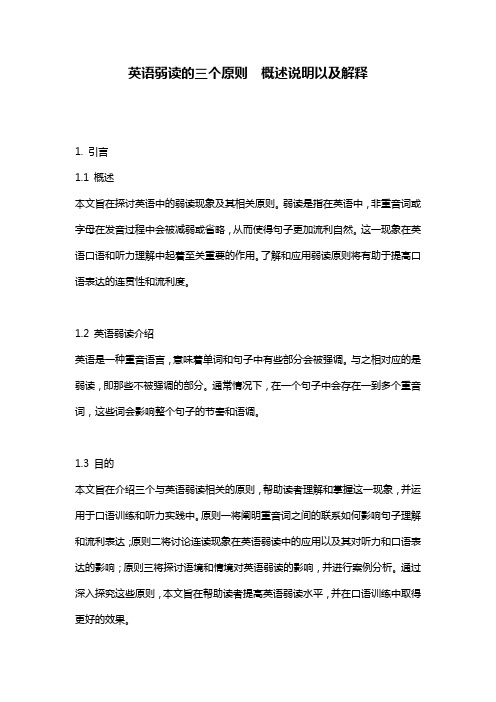
英语弱读的三个原则概述说明以及解释1. 引言1.1 概述本文旨在探讨英语中的弱读现象及其相关原则。
弱读是指在英语中,非重音词或字母在发音过程中会被减弱或省略,从而使得句子更加流利自然。
这一现象在英语口语和听力理解中起着至关重要的作用。
了解和应用弱读原则将有助于提高口语表达的连贯性和流利度。
1.2 英语弱读介绍英语是一种重音语言,意味着单词和句子中有些部分会被强调。
与之相对应的是弱读,即那些不被强调的部分。
通常情况下,在一个句子中会存在一到多个重音词,这些词会影响整个句子的节奏和语调。
1.3 目的本文旨在介绍三个与英语弱读相关的原则,帮助读者理解和掌握这一现象,并运用于口语训练和听力实践中。
原则一将阐明重音词之间的联系如何影响句子理解和流利表达;原则二将讨论连读现象在英语弱读中的应用以及其对听力和口语表达的影响;原则三将探讨语境和情境对英语弱读的影响,并进行案例分析。
通过深入探究这些原则,本文旨在帮助读者提高英语弱读水平,并在口语训练中取得更好的效果。
2. 原则一:句子中重音词之间的联系2.1 强读和弱读的定义在英语中,每个单词都有一个或多个音节。
通常情况下,这些音节中的一个会被发音得更响亮并且更加明显,这就是强读音节。
而其他音节则不发出强烈的声音,这些被称为弱读音节。
强读和弱读对于准确理解和表达英语句子非常重要。
2.2 重音词对句子理解的影响在一句话中,通常有一个或多个单词是重音词,也就是说它们的其中一个或多个音节属于强读音节。
重音词承载着句子中最关键、最具有信息量的部分,因此能够显著影响听者对整个句子意义的理解。
当我们将重点放在重音词上时,可以更好地体现出句子所要表达的含义。
而忽略了或错误地判断了重音词可能导致对句意产生误解。
2.3 弱读如何帮助实现流利口语表达弱读是英语口语流利性的关键之一。
通过正确地运用弱读规则,我们能够在表达时更加自然、流畅地连接单词。
弱读帮助我们快速准确地传递信息,使得语速更快、更接近英语母语者的发音。
英语中读音中强读、弱读、连读、失爆等规则
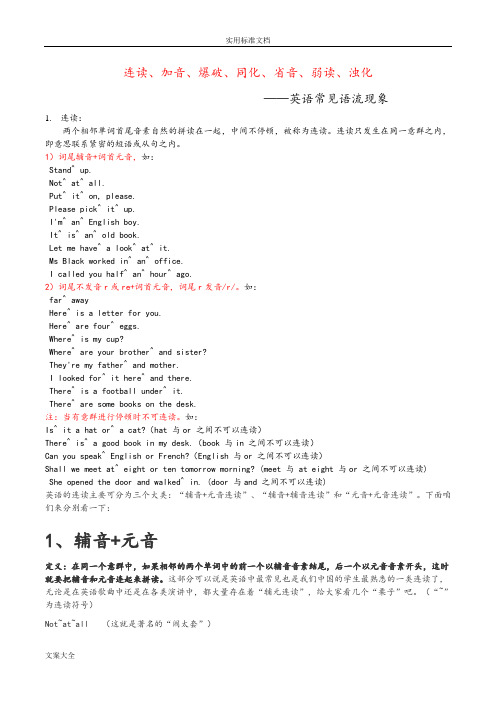
连读、加音、爆破、同化、省音、弱读、浊化——英语常见语流现象1.连读:两个相邻单词首尾音素自然的拼读在一起,中间不停顿,被称为连读。
连读只发生在同一意群之内,即意思联系紧密的短语或从句之内。
1)词尾辅音+词首元音,如:Standˆup.Notˆatˆall.Putˆitˆon, please.Please pickˆitˆup.I'mˆanˆEnglish boy.Itˆisˆanˆold book.Let me haveˆ a lookˆatˆit.Ms Black worked inˆanˆoffice.I called you halfˆanˆhourˆago.2)词尾不发音r或re+词首元音,词尾r发音/r/。
如:farˆawayHereˆis a letter for you.Hereˆare fourˆeggs.Whereˆis my cup?Whereˆare your brotherˆand sister?They're my fatherˆand mother.I looked forˆit hereˆand there.Thereˆis a football underˆit.Thereˆare some books on the desk.注:当有意群进行停顿时不可连读。
如:Isˆit a hat orˆ a cat?(hat 与or 之间不可以连读)Thereˆisˆ a good book in my desk.(book 与in 之间不可以连读)Can you speakˆEnglish or French?(English 与or 之间不可以连读)Shall we meet atˆeight or ten tomorrow morning? (meet 与 at eight 与or 之间不可以连读)She opened the door and walkedˆin. (door 与and 之间不可以连读)英语的连读主要可分为三个大类:“辅音+元音连读”、“辅音+辅音连读”和“元音+元音连读”。
语音课讲义-强读与弱读

强读与弱读(Strong Form and Weak Form)英语中的某些单词,由于在连贯的语句中相互影响而产生强读和弱读两种语音形式(称为强式或弱式)。
凡是有强式和弱式的单词一般在词典中均有音标标注,有些词的弱式有两种或多种发音,列在最后面的最弱。
下面列举一些最常用单词的强弱读形式:1.特殊动词(系动词、助动词和情态动词)be /bi:/ →/bɪ/do /du:/ →/dʊ, də, d/ can /kæn/ →/kən, kn/is /ɪz/ →/s, z/ does /dʌz/ →/dəz, z, s/ could /kʊd/ →/kəd/am /æm/ →/əm, m/ shall /ʃæl/ →/ʃəl, əl, ʃl, l/must /mʌst/ →/məst, məs/are /a:/ →/ə, ər/ should /ʃʊd/ →/ʃəd, ʃd, ʃt/ will /wɪl/ →/əl, l/was /wɒz/ →/wəz/have /hæv/ →/həv, əv, v/ would /wʊd/ →/wəd, əd, d/were /wɜː/ →/wə, wər/ has /hæz/ →/həz, əz, z, s/been /bi:n/ →/bɪn/had /hæv/ →/həd, əd, d/2.代词he /hi:/ →/hɪ, i:, ɪ/ she /ʃi:/ →/ʃɪ/ you /ju:/ →/jʊ, jə/his /hɪz/ →/ɪz/ her /hɜː/ →/ hə, ɜː, ə/ your /jɔː/ →/jə/our /aʊə/ →/a:(r)/ me /mi:/ →/mɪ/ we /wi/ →/wɪ/that /ðæt/ →/ðət/ them /ðem/ →/ðəm/who /hu:/ →/hʊ, u:, ʊ/3.冠词、介词、连词a /eɪ/ →/ə/ to /tu:/ →/tʊ, tə/ but /bʌt/ →/bət/an /æn/ →/ən, n/ for /fɔː/ →/fə/ and /ænd/ →/ənd, nd, n/the /ði:/ →/ðɪ, ðə/ or /ɔː/ →/ə/ than /ðæn/ →/ðən, ðn/at /æt/ →/ət/ as /æz/ →/əz/ of /ɒv/ →/əv, ə, v, f/强读变弱读的规律:1.长元音变成短元音,如be, me, to, you;2.元音变为/ə/,如at/and/are/but中的元音都变为/ə/;3.省略元音,如is/have/will/not中的元音可省略;4.省略辅音,如has/he/must/shall中的辅音/h, t, l/都可以省略。
- 1、下载文档前请自行甄别文档内容的完整性,平台不提供额外的编辑、内容补充、找答案等附加服务。
- 2、"仅部分预览"的文档,不可在线预览部分如存在完整性等问题,可反馈申请退款(可完整预览的文档不适用该条件!)。
- 3、如文档侵犯您的权益,请联系客服反馈,我们会尽快为您处理(人工客服工作时间:9:00-18:30)。
•
Was he there?
• 27) were /wə/
•
We were very pleased.
• 28) have /həv/, /əv/, /v/ • • They've left. Have any been lost?
• 29) had /həd/, /d/
•
• •
They had better hurry.
要在连贯说话中应用弱读
形式,不是懂得了道理就 能学会的,也不是一朝一 夕就能掌握的,需要通过
大量的模仿和练习才能学
好。
朗读下列句子,注意弱读
• • 1) to /tə/ but /bət/ I want to come but I can't.
•
• • • •
2) and /ənd/
He's rich and famous. 3) than /ðən/ /ðn/ Better than that. He's older than she is.
• 大多助动词、系动词、介词、
连词、冠词、代词,都有两
种发音形式:强读式、弱读 式。
• 这些单词往往都是单音节单 词。
弱读的形式
1.大多数有弱读形式的单词中,元音都变成了/ ə /; at / ət/ ; as /əz/; had / həd/;must /məst/ 2.有少数几个单词的弱读形式变成了/i /;
How shall I do like that?
38) when /wən/ Her parents had been dead when she was a child. 39) will /əl, l/ He will go back home tomorrow.
40) would /wəd, əd, d/
He would be happy if he had passed the exam.
弱读问题对策
1.反复聆听,熟悉弱读。 单词的弱读会导致考生实际听到的发音与 自己熟悉的发音出现偏差,因此在平时复 习时,考生应留意单词在句中的弱读,并 对其进行反复聆听,直至完全熟悉该弱读 现象 2.熟记常见习语中的弱读。 平时记忆听力短文、对话中的常见习语时, 应注意其中是否含有单词的弱读,并将其 与这些习语一并牢记。
• 12) you /jə/
•
What do you think?
• 13) your /jə/ • Take your time. • 14) us /əs/
•
Let us think it over. • 15) that /ðət/
•
This is the house that Jack built.
• 30) has /əz/ What has he done? He has just arrived. • 31) do /du/, /də/
•
• • •
Do you think so?
• 32) does /dəz/ When does he leave? • 33) can /kən/, /kn/ Can you hear me?
There aren't any more. • • 8) he /hi/
Does he want any? • 9) her /hə/
•
I've met her mother.
•
• • •
10) him /im/
Tell him I'd like to.
11) them /ðəm/ /ðm/ I haven't seen them yet.
be /i/; been /bin/; me /mi/; the /ði/
3.有时,一些常用词的弱读形/; is / z /
4. 有时,一些常用的弱读形式中省略了一个辅音。
and / ən/; have / əv/; would /əd/; her /ə:/
• 34) could /kəd/
Could you do it now?
35) should /∫əd/ How should I know? 36) there /ðə/ There is nothing left. There are not enough. 37) shall /ʃəl, ʃl/
• 22) the /ðə/ /ði/
• That's the one.
• 23) am /m/
• I'm going now.
• 24) are /ə/
•
Where are you going?
• 25) is /z/ /s/ • • He's here. My hat is here. • 26) was /wəz/
弱读的规则一般是:元音音节弱化成 [ə] 或[i] 。
如下几个单词:at, of, the, to, as, than, and, or, his, a,
an, but, been, for, her, we, be, shall, was, them, 弱读的 频率达到90%,其中a, an, the, than极少用强式。 查字典会发现这些词都至少有两种读音,如for: 重 读时[fכ:] , 弱读时 [fə];as的强读形式是/ æz/ ,弱 读形式是/əz/。
Strong Forms& Weak Forms
强读和弱读
弱读
一个英文单词如果由多个音节构成,那 么其中至少有一个音节是重音;如果,音节 足够多的话,那么可能还有次重音以及一个 以上的重音。 同样的道理,一个句子由多个单词构成, 那么,其中总是有至少一个单词被强读,而
相对来看,其它的单词会被弱读。
•
• • •
4) but /bət/
She wants to sing but she can't. 5) such /sət∫/ We have problems, such as pollution.
•
6) some /səm/
•
There are some copies here.
• • 7) any /əni/
• 16) at /ət/
• At least one. • 17) for /fə/ • It's for you.
• 18) from /frəm/ • He comes from England. • 19) of /əv/
•
I'd love a cup of tea.
• 20) to /tə/ • You ought to go. • 21) an /ən/ • I'd like an apple.
